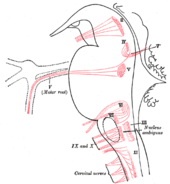Trigeminal nerve nuclei
From Wikipedia, the free encyclopedia
| Brain: Trigeminal nerve nuclei | |
|---|---|
 The cranial nerve nuclei schematically represented; dorsal view. Motor nuclei in red; sensory in blue. (Trigeminal nerve nuclei are at "V".) | |
| Latin | nuclei trigemini |
| Gray's | p.787 |
| NeuroNames | ancil-1008020136 |
| MeSH | Trigeminal+nuclei |
| NeuroLex ID | nifext_11 |
The sensory trigeminal nerve nuclei are the largest of the cranial nerve nuclei, and extend through the whole of the midbrain, pons and medulla.
The nucleus is divided into three parts, from rostral to caudal (top to bottom in humans):
- The mesencephalic nucleus
- The chief sensory nucleus (or "pontine nucleus" or "main sensory nucleus" or "primary nucleus" or "principle nucleus")
- The spinal trigeminal nucleus
- The spinal trigeminal nucleus is further subdivided into three parts, from rostral to caudal:
- Pars Oralis
- Pars Interpolaris
- Pars Caudalis
There is also a distinct trigeminal motor nucleus that is medial to the chief sensory nucleus.
See also
Additional images
-

Dissection of brain-stem. Lateral view.
-

Deep dissection of brain-stem. Lateral view.
-

Nuclei of origin of cranial motor nerves schematically represented; lateral view.
-

Primary terminal nuclei of the afferent (sensory) cranial nerves schematically represented; lateral view.
External links
- n2a4p5 at the University of Michigan Health System
- Washington University
- 1301938236 at GPnotebook
| |||||||||||||||||||||||||||||||||||||||||||
| |||||||||||||||||||||||||||||||||||||||||||||||||||||||||||
This article is issued from Wikipedia. The text is available under the Creative Commons Attribution/Share Alike; additional terms may apply for the media files.